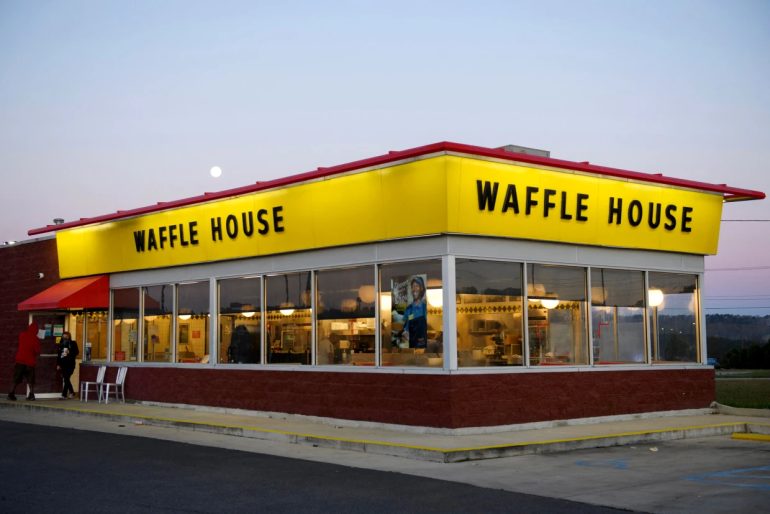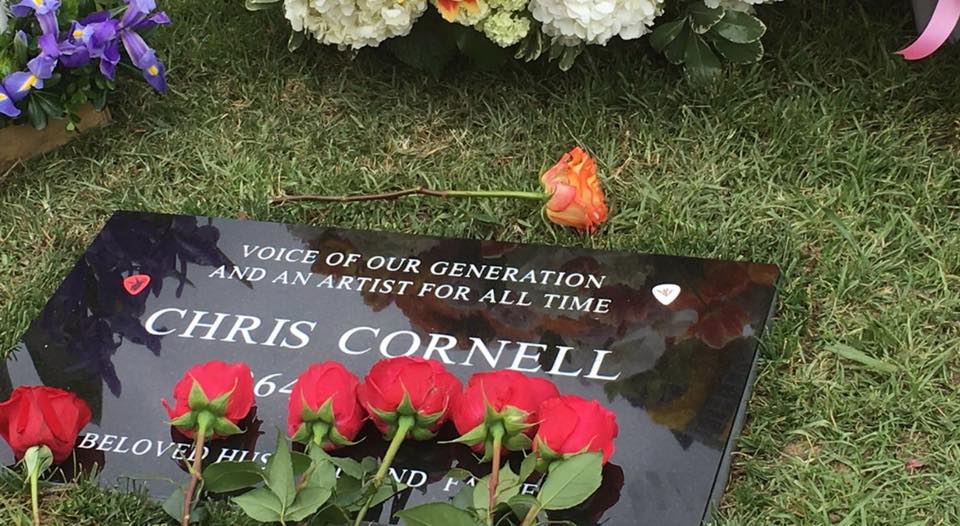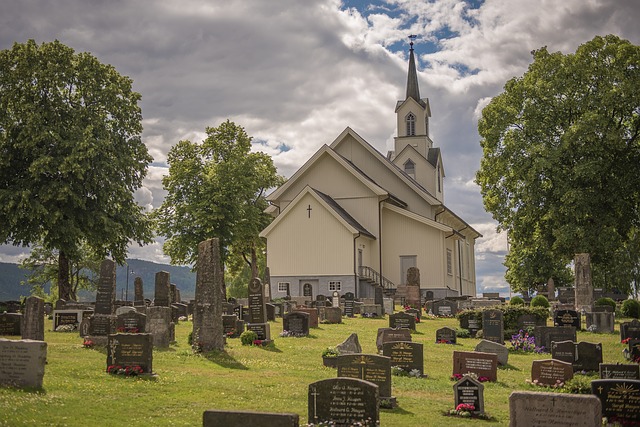Megan Peck Shub
We would drive three hours to the Waffle House across the Georgia border, just to smoke a cigarette inside a restaurant.
“For our catalog of human experience,” Ruthie declared. The excursion was almost her idea. She’d heard of someone else doing it before—someone’s older sibling—after smoking indoors was outlawed in Florida. Our ideas were seldom our own. We were 16 and vastly impressionable, anyone’s hand on us would leave a print of some kind, a concave space. We were wet cement.
Ruthie pushed toward the cash register two bags of potato chips and a fountain soda the size of a jet engine. “I wish I’d thought of it myself,” she said. “This whole thing.”
“I’m sure you could have, if only given the chance,” I said. “You can’t invent the wheel twice, right?”
I thought I’d said something wise, worthy of at least a nod, but Ruthie was directing our clerk, Gabe, our dear Gabe, who never carded us, along the wall of cigarettes behind him. She chose the Camel Lights marked buy-one-get-one-free, a sales strategy which hooked me and my microgeneration of performatively rebellious Central Florida teenagers on nicotine. When I’d get older, I’d date a guy who worked in some capacity for Philip Morris. He’d cheat on me and then we’d break up and I’d feel apocalyptic loss before meeting another guy and feeling reborn all over again via his love. (And again, and again.) But that night, at the flecked Formica counter, standing in the heat of the 7-Eleven hot dog-slash-taquito roller, staring at its cargo of shriveled pink tubes glistening in the yellow lamplight, I hadn’t known any of that.
“No need for plastic,” Ruthie said as Gabe rang us up. She stuffed our provisions in her canvas tote, one of the types circulating among a certain margin of cool young people: screen printed with the name of a local band, covered in pins.
“Have yourselves the loveliest of evenings, ladies,” said Gabe. He lacked the beleaguered air of his colleagues. He always seemed happy to be alive, like there was a spring bubbling up deep inside him, all the way from his soul right to his eyes, bright and effervescent. “God is on my side,” he always told us. A few years later he’d survive an armed robbery.
When we pulled onto the interstate, the night was black, buttoned with a full moon and the stars eking through the suburban light pollution. It was ten o’clock. We calculated that we’d be taking our seats at Waffle House around one AM. We would turn around and make it back to Ruthie’s house to tuck ourselves beneath her plaid comforter before her mother, Yvonne, would wake, her hair yanked up into curlers.
We drove my car; Ruthie didn’t have one. My family had more money than hers—one of those implicit social facts which embeds itself within any teenage relationship. High-schoolers sort themselves out according to all kinds of spoken and unspoken criteria, and money was certainly one of them. Ruthie’s father had died a few years earlier, but nobody knew how, and the vacuum of speculation was pitch dark: suicide, illness, murder. Yvonne, was a sweet lady, probably somewhere on the alcoholic spectrum, who called everyone “baby” and doted on us with store-bought cookies. She was older than my mom and told excellent stories about her former life as a genuine Weekee Wachee mermaid. She also swore she’d hooked up with Ted Bundy in the 70s. (I’d later understand, once I moved away, that every Floridian experiences a close brush with at least one character who’ll become nationally infamous. I have my own stories, of course.)
“We should educate ourselves,” Ruthie said, turning the dial to public radio, which played a segment of BBC international news at that hour. For a few minutes, a cut-glass anchor voice regaled us with stories of violent clashes on the other side of the world.
“My brother enlisted in the military,” I said, though I hadn’t planned to tell Ruthie, knowing she wouldn’t approve, and knowing, too, that I sought her approval. “What can I do?” I said, “It’s out of my hands.” I was repeating my mother’s words, though she’d lied to herself. She could’ve supported him in a million ways that she hadn’t. She’d pushed him out of the house like a baby bird, and I’d be next.
My eyes were on the highway, but in my peripheral vision I saw Ruthie shaking her head, pulling the cellophane off a fresh pack of cigarettes.
“I’d like to yank the Bush twins out of their sororities and helicopter them onto a mountain in Afghanistan,” she said. “But of course, I’m a pacifist.”
“He’s not enlisting because of political opinions,” I said. “He doesn’t have any of those. It’s just something to do. He’s not a good student.”
“My Dad was in Vietnam,” she said.
“I know,” I said, though I didn’t mean to reveal that I knew anything about Ruthie beyond what she’d shared. Better for it to remain unknown: how she intrigued me, the extent to which I’d studied her as a template for myself. “Yvonne told me,” I added, tightening my fingers on the wheel.
“It didn’t go well for him,” she said, lifting a match to the end of her cigarette and shaking out the flame like a flag.
The highway felt like a metaphor, I thought, pleased with my connection and then immediately disappointed by its hackneyed simplicity. Anyway, it was true: all we could see was what lay directly ahead. Everything else morphed to abstract shapes, some more dangerous than others. Beyond the billboards and dividers and the mowed roadside grasses lay territory we knew only in theory.
Ruthie and I talked about school. Who were the favored teachers, who were the assholes. The substitute who got fired for partying with a bunch of cheerleaders. We talked about the theater teacher who passed out Bible tracts. We talked about the separation of church and state. We talked about Ruthie’s ex-boyfriend, who’d joined the exodus to Austin, Texas and played bass in a famous band and had an inbox full of naked pictures sent from girls. We talked about music. New Wave, we both liked. Metal, I didn’t understand. All of that noise. Ruthie said you had to feel it rather than hear it, there was no other way. We talked about how the two of us met, how we weren’t sure when it happened, we’d gravitated toward each other. About how Ruthie’s bed was in the closet, an unorthodox position, its novelty inspiring everyone to ask their mothers if we could do the same, all our mothers shooting us down like skeet. We talked about the future: Ruthie wasn’t sure about anything. She resisted planning. She said she harbored no ambition other than to live an interesting life.
At a gas station in Jacksonville, about a half hour from the Georgia border, I looked in my backpack and discovered a hitch in our plan-that-was-not-our-plan, our weak facsimile of some previous person’s capricious genius. I had forgotten my wallet in Ruthie’s bedroom.
“Well, shit,” I said. “How much money do you have left?”
“Two bucks,” Ruthie said, her fingers trawling through my cupholders for loose change. “You should clean your car more often. Something melted in here.” I reached over her knees and tapped open the glovebox, where my father had stuck a twenty dollar bill in the car’s manual in case of an emergency.
“How much gas did it take to get to this point?” Ruthie asked
“I’m not sure,” I said, my face on fire with shame. I hadn’t kept track. My enthusiasm for the drive had choked its logistics. “Should we turn around?”
“We’re almost there. Why would we turn around?”
“Because we’re screwed?”
“We have 22 dollars.”
“I don’t think that will buy enough gas to get home—let alone food at Waffle House.”
“Who said anything about food? We’re going there to smoke a cigarette. Inside. In a booth. That was the mission.”
I wanted to tell her I was hungry, but my hunger seemed inconvenient. I said nothing as she took the bill from the glove box and went to pay the attendant, the guy who’d been staring at us from a bulletproof glass booth, like the one where Eichmann sat for his trial.
Speaking of glass boxes: the Waffle House. My heart jumped as it appeared in the distance, a beacon of blinding white fluorescence beneath a sign tall enough to be spotted by ships out in the Atlantic.
“We’ll take one coffee,” Ruthie said to the waitress, who wore two pens crisscrossed like a TV antenna in her ponytail. I ran my hands over the molded plastic booth.
“One coffee is all?” said the waitress. Her name tag said “PEGGY,” italicized and underlined and followed by several hieroglyphs, someone’s zany experiment with the label maker.
“We’ll share,” I said, and Peggy sighed like a rusty hinge. Peggy conserved her charm and energy for big rig drivers who ordered up their future heart attacks and tipped her fifty percent. Peggy was actively against us.
She cocked her head. “No refills then.”
“That’ll be all,” Ruthie said.
My stomach sputtered. The smell of bacon was poised to bring tears to my eyes.
“You can have the coffee,” Ruthie said, after Peggy left to retrieve it. “You’re driving.”
“Look,” I said, nodding at the ashtray on the table. As I nudged it between us, Ruthie pulled two cigarettes from a pack. She stuck one between my lips, one between hers, and lit mine first. Like an oil painting, my memory has snared her image leaning forward hospitably, like Mary to the Christ, haloed by bleach-blond hair.
“How does it feel?” I said, exhaling smoke.
I longed for her to say something profound. Something I’d remember forever, even when the years had whittled away all the joy and happiness and spontaneity from life—that was how I envisioned aging at 16.
What we did not yet know, sitting in that booth, were the desperate last miles of our trip yet to come, how the dawn would rise over the asphalt river of road, the gas meter sunk to nothingness as Ruthie would scramble for pennies and nickels in the seat pockets of the car. At the third gas station on our journey, the clerk would let us scoop quarters from the Shriners Hospital jar, on the grounds that we counted as children in need. On fumes, we’d make it to Ruthie’s house and pile our bodies into her closet bed, along with a clamshell of Yvonne’s blueberry muffins, their sugary tops sparkling like geodes.
I hoped for so much from Ruthie, but she sat silent, staring out the Waffle House window at the highway, where the cars went, went, went. There were always more, their headlights scoping the dark.
(I’d lied earlier, I knew exactly when I met her. She’d tapped me on my shoulder in the school cafeteria and asked if I was throwing away my perfectly good, sealed carton of milk. Whatever she wanted—she could have it, I knew then.)
Peggy came and left with her carafe, me not grasping that she was ever there.
The coffee went cold in my hands.
Megan Peck Shub is a producer at Last Week Tonight with John Oliver. Her work has recently appeared in The Missouri Review, No Contact, Peach Mag, Salamander, and Vol. 1 Brooklyn. She is a contributing editor at Story magazine. Follow her on Twitter at @meganpeckshub.



